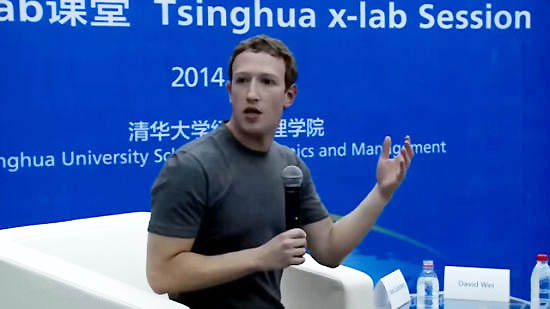當(dāng)前位置: Language Tips> 雙語新聞
How good really is Mark Zuckerberg's Mandarin?
分享到

|
Confucius said the superior man puts all his energy into everything he does... On Wednesday, armed only with his favourite grey T-shirt and goofy smile, Mark Zuckerberg held court in one of China’s most prestigious universities for half an hour. In Mandarin. So this son of a New York dentist gets a gold star – or a red flower, as they are called in China – for not only mastering the internet by the age of 30 but also somehow finding time to learn the world’s most difficult language. “Hello everyone,” he said, to whoops of excitement from the audience (who, being elite business students could all speak English). “There are three reasons I decided to learn Chinese. The first, my wife is Chinese. Her grandmother can only speak Chinese. When I told her in Chinese I was going to marry Priscilla, she was very shocked. Then I want to study Chinese culture. The third: Chinese is hard and I like a challenge!” After he posted a video, there were also swoons of envy across the world. Speaking Mandarin, with the assumption that it bring the keys to the new global superpower, is now such a prized social goal that Mark Zuckerbergwas instantly labelled a genius for his Chinese chitchat. Plenty of other tycoons, politicians and sycophants arrive in Beijing claiming to be beavering away at Chinese, but I have never seen anyone attempt more than a few polite interchanges before reverting to English. George Osborne, the Cabinet’s leading Sinophile, only got as far as a “hello” on his most recent visit. Zuckerberg was out of his comfort zone, but he just kept going.
A journey of a thousand miles begins with a single step So how good was Zuckerberg’s Chinese? It was good enough to wow the world, but in truth, four years of studying has brought him only to base camp. Mandarin still rises up before him, a mountain that most adult learners will climb for ever, with no peak to reach. I studied Chinese every morning for two hours for the first four years of my time here, but neglected my homework and have recently been overtaken by my three-and-a-half year-old son, who babbles away cheerfully to everyone he meets. One of my American colleagues wrote that Zuckerberg’s pronunciation was as if he had a “mouthful of marbles”. That is fine in French, where you can just about rub by with a wonky accent, but in China it is fatal. One slip of your tones and all meaning is lost. Zuckerberg was trying to say “China”, but it came out sounding like “Middle Kiss”. Still, it is not just foreigners who find Chinese tricky. In September, Li Weihong, the director of China’s State Language Commission, said about a third of China’s population, roughly 400 million people, cannot speak Mandarin either, preferring their local dialects. And of the 900 million people who can speak Mandarin, only 10 per cent speak it “fluently”, he said. |
孔子曰,吾道一以貫之 周三,穿著自己喜歡的灰色T恤,帶著憨厚微笑的馬克·扎克伯格(Mark Zuckerberg),在中國最負(fù)聲望的大學(xué)之一清華大學(xué)與主持人進(jìn)行了半個(gè)小時(shí)的普通話交談。 這個(gè)紐約牙醫(yī)的兒子因此獲得了一個(gè)獎(jiǎng)勵(lì),或者中國人說的獲得了一朵大紅花——他不僅在30歲就掌控了互聯(lián)網(wǎng),而且不知怎么還擠出時(shí)間,學(xué)會(huì)了世界上最難學(xué)的語言。 馬克·扎克伯格剛說完“大家好”,觀眾(作為精英商科學(xué)生都會(huì)說英語)就發(fā)出了興奮的呼喊。“有三個(gè)原因使我決定學(xué)習(xí)漢語。首先,我的妻子是中國人,她的祖母只會(huì)說中文,當(dāng)我用中文告訴他我將和普莉希拉結(jié)婚時(shí),她顯得很震驚,第二個(gè)原因是我想學(xué)習(xí)中國的文化,第三個(gè)原因是因?yàn)橹形暮茈y學(xué),而我喜歡挑戰(zhàn)。” 在他展示了一個(gè)視頻后,全世界都羨慕起他。講普通話,假設(shè)這可以打開這個(gè)新的全球超級(jí)大國的市場,這個(gè)社交目的是如此有利,以至于扎克伯格進(jìn)行普通話聊天后立馬被貼上了天才的標(biāo)簽。 許多其他的企業(yè)大亨、政治家和奉承者抵達(dá)北京時(shí)聲稱他們會(huì)好好學(xué)習(xí)漢語,但我從未見過有誰在用中文進(jìn)行簡單的禮貌問候之后還試圖繼續(xù)用中文交談。作為親華人士的英國財(cái)政大臣喬治·奧斯本,在最近的訪華過程中只學(xué)會(huì)一句中文“你好”。扎克伯格并沒有沉溺于自己舒適的溫室中,而是選擇繼續(xù)前行。
千里之行,始于足下 那么扎克伯格的中文到底怎么樣?雖然好到足以讓世界震驚,但事實(shí)上,4年的學(xué)習(xí)只讓他達(dá)到了山底的大本營,普通話這座大山仍然屹立在他面前,這是一座大部分成年學(xué)習(xí)者將要傾其一生去攀登,卻永遠(yuǎn)達(dá)不到頂點(diǎn)的山峰。在中國的最初四年,我每天早上花費(fèi)兩個(gè)小時(shí)學(xué)習(xí)中文,但我忽視了家庭作業(yè),最近我三歲半的兒子已經(jīng)超越我了,他見了誰都會(huì)興高采烈地牙牙學(xué)語。 我的一個(gè)美國同事寫道,扎克伯格的中文發(fā)音好像他嘴里塞滿了大理石,這在法語里是無所謂的,在法語里,你可以任由不靠譜的口音來改變聲調(diào),但在中文里,這是毀滅性的災(zāi)難,任何一個(gè)音調(diào)的滑落都會(huì)改變句子本身的意思。扎克伯克試圖說“中國”,但聽起來像是說“中間吻”。 而且,不只是外國人發(fā)現(xiàn)漢語是棘手的。在9月份,中國國家語言文字工作委員會(huì)主任李衛(wèi)紅表示:將近1/3的中國人,也就是約4億人,不會(huì)說普通話,他們寧愿說自己的方言。她還表示,在會(huì)說普通話的9億人中,只有10%的人表達(dá)流利。
|
分享到
關(guān)注和訂閱


關(guān)于我們 | 聯(lián)系方式 | 招聘信息
電話:8610-84883645
傳真:8610-84883500
Email: languagetips@chinadaily.com.cn